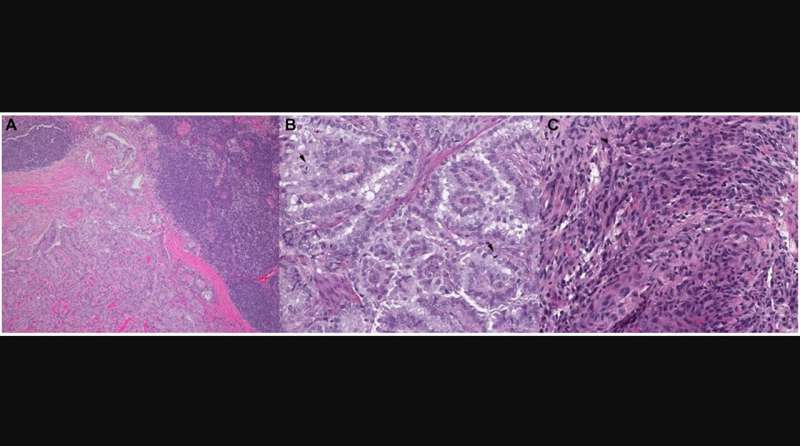This article has been reviewed according to Science X's editorial process and policies. Editors have highlighted the following attributes while ensuring the content's credibility:
fact-checked
peer-reviewed publication
proofread
Genetic alterations in thyroid cancer mediate resistance to BRAF inhibition and anaplastic transformation

A new research perspective titled "Genetic alterations in thyroid cancer mediating both resistance to BRAF inhibition and anaplastic transformation" has been published in Oncotarget.
In this new paper, researchers Mark Lee and Luc GT Morris from New York Presbyterian Hospital and Memorial Sloan Kettering Cancer Center discuss thyroid cancer. A subset of thyroid cancers present at advanced stage or with dedifferentiated histology and have limited response to standard therapy. Tumors harboring the BRAF V600E mutation may be treated with BRAF inhibitors; however, tumor response is often short-lived due to multiple compensatory resistance mechanisms.
"One mode of resistance is the transition to an alternative cell state, which on rare occasions can correspond to tumor dedifferentiation," write the researchers.
DNA sequencing and RNA expression profiling show that thyroid tumors that dedifferentiate after BRAF inhibition are enriched in known genetic alterations that mediate resistance to BRAF blockade, and may also drive tumor dedifferentiation, including mutations in the PI3K/AKT/MTOR (PIK3CA, MTOR), MAP/ERK (MET, NF2, NRAS, RASA1), SWI/SNF chromatin remodeling complex (ARID2, PBRM1), and JAK/STAT pathways (JAK1).
Given these findings, recent investigations have evaluated the efficacy of dual-target therapies; however, continued lack of long-term tumor control illustrates the complex and multifactorial nature of these compensatory mechanisms. Transition to an immune-suppressed state is another correlate of BRAF inhibitor resistance and tumor dedifferentiation, suggesting a possible role for concurrent targeted therapy with immunotherapy.
"Investigations into combined targeted and immunotherapy are ongoing, but early results with checkpoint inhibitors, viral therapies, and CAR T-cells suggest enhanced anti-tumor immune activity with these combinations," the researchers add.
More information: Mark Lee et al, Genetic alterations in thyroid cancer mediating both resistance to BRAF inhibition and anaplastic transformation, Oncotarget (2024). DOI: 10.18632/oncotarget.28544


















